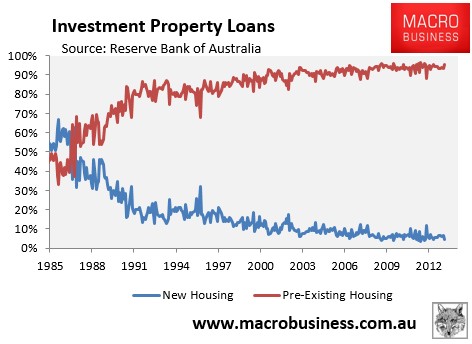So why then did the Gubbmint move so quickly to have it re-installed back in the '80's after it was first removed?Removal of NG on existing housing would have no impact on rents, properties sold by investors still exist, they do not vanish. This is a common myth pushed by vested interests.
Install the app
How to install the app on iOS
Follow along with the video below to see how to install our site as a web app on your home screen.
Note: This feature may not be available in some browsers.
You are using an out of date browser. It may not display this or other websites correctly.
You should upgrade or use an alternative browser.
You should upgrade or use an alternative browser.
Housing Affordability Push to Impact Negative Gearing?
- Thread starter hobo-jo
- Start date
More options
Who Replied?Because housing construction wasn't keeping up with demand (especially in Sydney) and the removal of negative gearing was blamed. In this new proposal I expect is coming, Xenophon hints that NG would remain for newly constructed homes which would encourage investors to remain or increase in that space.So why then did the Gubbmint move so quickly to have it re-installed back in the '80's after it was first removed?
Most property "investing" in the current market is speculators flipping established homes to each other (very different to the 1980s):

I doubt Somersoft is a representative cross-section of Australian property investors.No one on these forums has mentioned flipping established properties and id say this is a decent cross section of "investors"
What I meant by the post is that investors were buying a lot more newly constructed homes to rent out in the 1980s, buying homes that added to supply, mostly these days they buy established. So removal of negative gearing for established dwellings is not likely to impact negatively on rental stock.
If grandfathered cant see how it would impact on rents like last time when it was removed. A stepped approach would work much better and be more politically acceptable.
Ng-ing was grandfathered when Keating 'removed' it last time. The very short period it was absent, and grandfathered meant that any rent rises were only very very partially due to the removal of NG-ing. There were obviously other factors at play.
NICK XENOPHON, INDEPENDENT SENATOR: We need to have a mature, considered debate in this country about modifying negative gearing over a number of years, but we need to begin now.
http://www.abc.net.au/7.30/content/2014/s4123289.htmNICK XENOPHON: If it's modified to ensure that there is a real driver in new home investments with respect to the rental market, affordable housing, then negative gearing could play a very useful social and economic role.
I beat you by 4 posts. 
Also we have Abbott & Co who is looking to:
- Make budget savings
- Not appear to only be hitting the disadvantaged with cuts
- End the age of entitlement
I don't think there's been a more appropriate time to end negative gearing on established dwellings from a political perspective.
IMO watch this space over the next couple of months.
Well... looking less likely than at the time I started this thread given Abbott's recent comments.
An article I wrote yesterday for anyone interested: http://www.bullionbaron.com/2015/04/the-politics-of-negative-gearing.html
Though I suspect given most investors are negatively geared (according to the most recent ATO stats) I wouldn't expect much support here to see it go.
Here is example I used on another forum for perspective:
If speculators were attracted by certain tax efficiencies in a government controlled market for basic foods (say vegetables & fruits) sending prices soaring and families were no longer able to afford them, but instead had to survive on rice, would there be a legitimate reason for government to intervene?
Assume they'll get rid of neg hearing on shares as well?
It sure has been a cash help to those that've used it. Taxpayers help with debt and then you get a 50% tax break with the cg.
What a country!
They would have to or a trust scheme would circumvent direct property.
If speculators were attracted by certain tax efficiencies in a government controlled market for basic foods (say vegetables & fruits) sending prices soaring and families were no longer able to afford them, but instead had to survive on rice, would there be a legitimate reason for government to intervene?
Not if they wanted to be re-elected in the future.
Touche, though guess it depends on whether those affected negatively outnumber those affected positively by the policy.Not if they wanted to be re-elected in the future.
Similar threads
- Replies
- 33
- Views
- 7K
